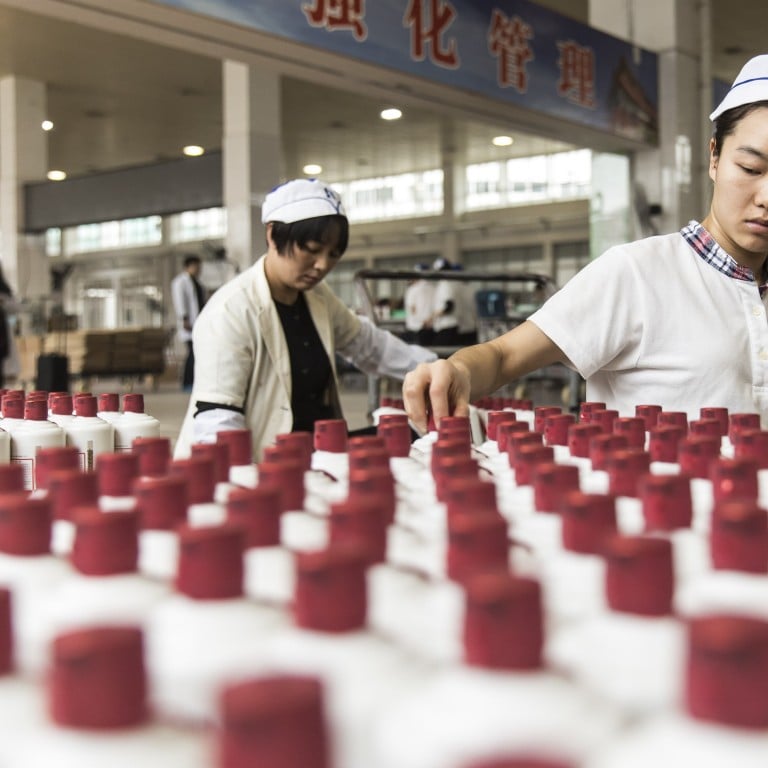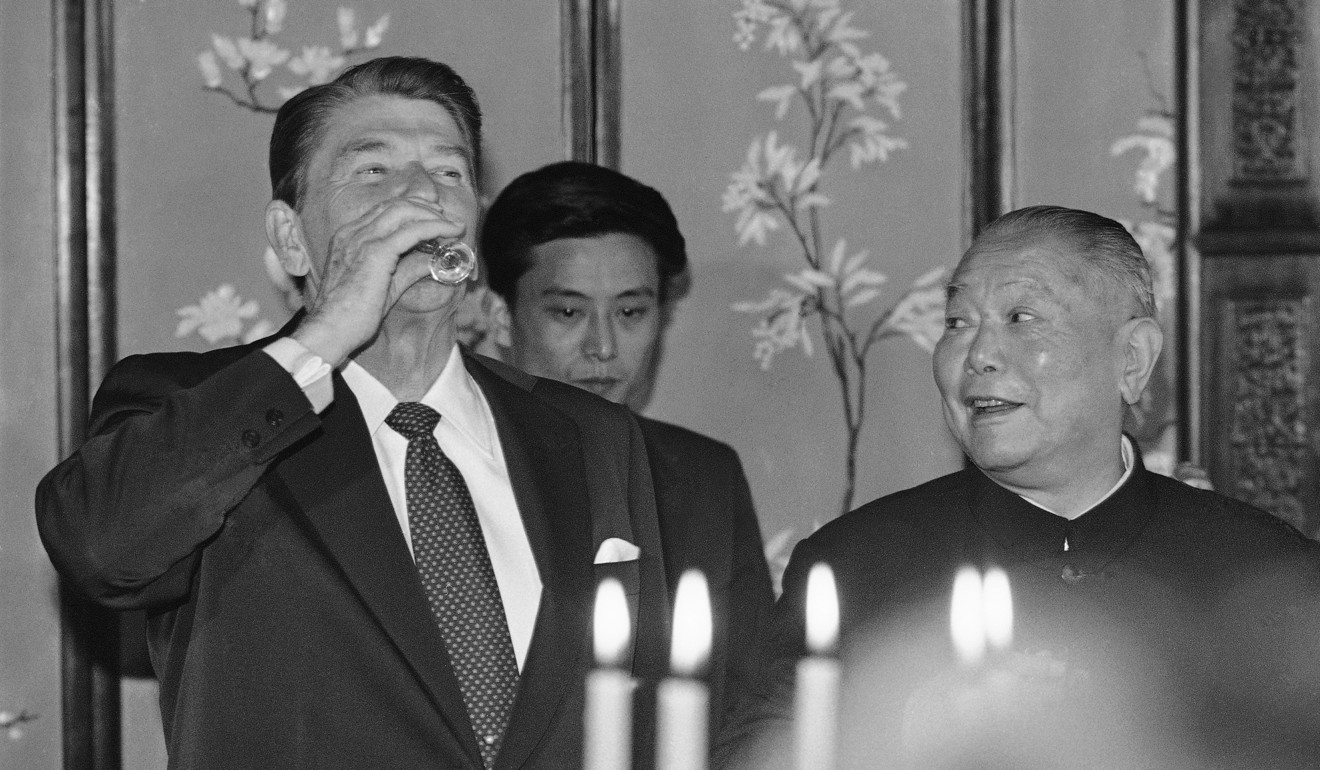
Liquor king Kweichow Moutai pours confidence back into shaken investors
- Change in sales distribution sparks backlash – and biggest attendance ever at annual shareholder meeting
- Chairman reassures many investors about stock that has delivered huge returns
Kweichow Moutai – the world’s most valuable alcohol maker that recently found itself in the hot seat over a controversial change in its sales distribution model – appears to have regained the confidence of many of its investors on the back of its largest-ever shareholder meeting.
Its fiery rice liquor is hugely popular in China, and was used by the late Chinese leaders Mao Zedong and Zhou Enlai to toast guests at state banquets, including US president Ronald Reagan. Its flagship Feitian Mao-tai, with a head-spinning 53 per cent alcohol content, sells for as much as 2,300 yuan (US$333) a bottle.
Its stock has been hugely popular as well – for good reason.
Kweichow Moutai has delivered an annual return of 32 per cent since it started trading on the Shanghai Stock Exchange in 2001. That’s nearly 13 times the returns on the Shanghai Composite Index in the same time period, according to Bloomberg data. This year, the liquor stock is up a mouth-watering 51 per cent.
Those kinds of results have also made it one of the most popular stocks for foreign investors through the Hong Kong-China Stock Connect programme. Foreign investors now own a combined 10 per cent stake.
But when Moutai announced in May that its state-owned parent China Kweichow Moutai Winery Group had set up a wholly-owned unit to sell some of Moutai’s liquor, Chinese shareholders were incensed, exploding on social media Weibo with such comments as, “Could you use your brain before making such a decision,” and, “It’s a blatant theft from small shareholders.” One angry investor even mailed a copy of China’s securities law to the board secretary.
Some feared the move was intended to transfer profits from the listed company to the state-owned parent, given the huge gap between the factory gate and retail prices. The Shanghai Stock Exchange issued an inquiry letter to the company, asking for more clarification.
Moutai’s shares plunged by almost 12 per cent in next three days, wiping out 143.3 billion yuan (US$20.7 billion) in market value.
But Kweichow Moutai chairman Li Baofang appeared to soothe many shareholders’ concerns at the gathering, speaking to them for hours in a talk that was broken up dozens of times by applause.
“We will never do anything that harms the interests’ of shareholders,” Li said firmly. “The controlling shareholder will never fight with small shareholders for benefits.”
Comments like that reassured an attending Shenzhen-based fund manager who identified himself as Chen.
“Li’s repeated iteration of his attitude on the subsidiary issue offered me huge encouragement and assurance,” said Chen, who has seen a near-fivefold return since he bought Kweichow Moutai’s shares for over 200 yuan in 2016.
He left the meeting believing Kweichow Moutai will eventually scrap the plan allowing the parent a hand in the sales network or put the new sales unit under the listed company, both of which would keep the interest of small shareholders unhurt.
Chen was among the more than 2,000 investors who streamed into Maotai, a small town in China’s southwestern Guizhou province that produces the expensive liquor named after it. To get a sense of how important it was for Moutai to get the meeting right, fewer than 600 investors showed up last year.
Huge billboards welcomed the visitors. “Shareholders are Moutai’s eternal family, and your trust gives us courage and strength to move forward,” one read. In addition, shareholders were offered Kweichow Moutai’s flagship products at a sharp discount to the retail prices.

Kweichow Moutai picked Li only a year ago, and he set his sights on cleaning up the distribution channel, long considered ripe for abuses.
Moutai is over 60 per cent owned by its government-controlled parent, and accounts for one seventh of Guizhou province’s tax income. Its factory-gate prices are suppressed by the government at an artificially low level, because its affordability is seen as an issue concerning people’s livelihood.
Thus a qualified distributor can make more than 100 per cent profits by selling Feitian Moutai, which is tagged at 969 yuan for the factory-gate price and more than 2,000 yuan at the retail end per bottle.
That has led to a breeding ground for corruption within Kweichow Moutai’s senior executives. In May, former chairman Yuan Renguo was arrested on charges from bribery to picking up unqualified dealers.
Li, determined to clean up abuses, has slashed the number of Moutai distributors by a sixth to less than 2,500 in the first quarter, disqualifying many who gained the highly profitable distributing rights through connections or other shady practises.
But the direct sales unit Li set up, which is independent from the listed company, is seen as a dangerous step by many shareholders. This is because the unit could potentially take the Moutai supply previously in the hands of distributors at a much lower price, given that it’s backed by Moutai’s parent. Market oversight and competition will not be in place to make sure that the listed company does not compromise its own interests to profit the unit, investors say.
While some were concerned by the fact that Li did not go into specifics on how the sales-distribution issue will be resolved at the shareholder meeting, his promise and overall tone have convinced many that they can expect a fair treatment.
The hope for continued outsize returns voiced by shareholders in interviews was reinforced by a report by investment bank China International Capital Corp. (CICC) last week predicting the stock could rise tenfold in the next decade as Chinese consumers opt for more expensive goods amid increasing affluence.
That kind of bullishness is felt by another investor, surnamed Sun from the eastern city of Suzhou, who said he has poured his savings into Kweichow Moutai, and still has stocks he bought for around 300 yuan in 2017. He left the meeting pumped up.
“The biggest feature of Moutai is that it will never have to worry about sales,” he said.


